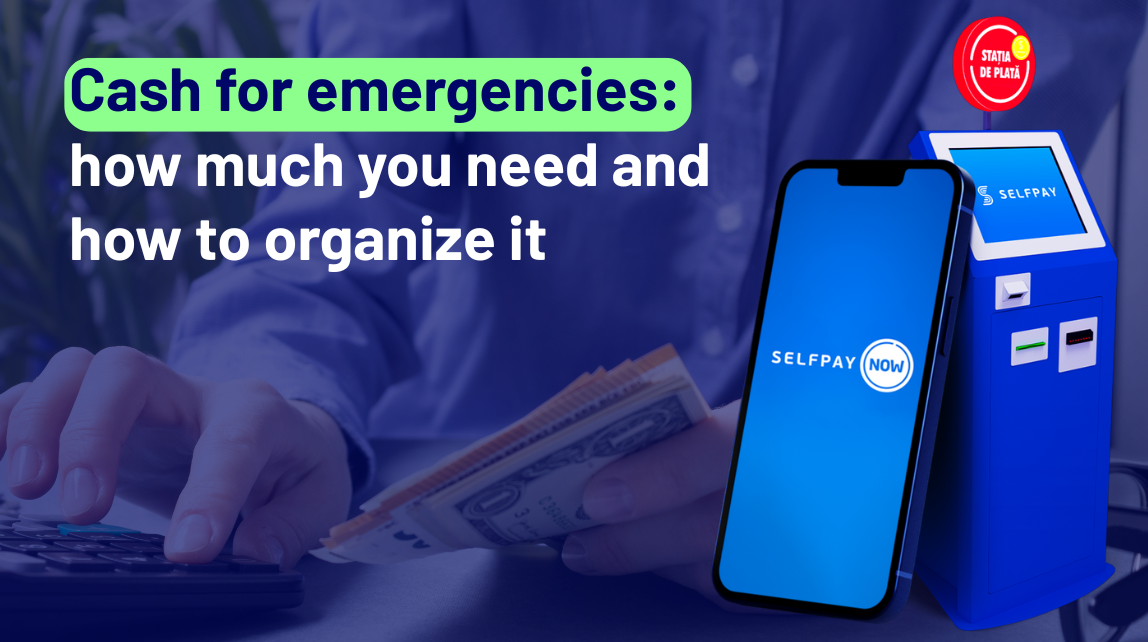October 3, 2025
Why it is good to have a small cash reserve for emergencies and how SelfPay complements this balance

In recent years, we have come to depend almost entirely on cashless payments. The card and the mobile phone have become the main tools when we go shopping, pay bills, or subscribe to services. It is fast, convenient, and transparent. However, reality has shown us more than once that modern systems can be vulnerable. Major power outages, internet network failures, or exceptional situations such as extreme weather events can block access to electronic payments for hours or even days. In these moments, cash remains the only solution.
It is no coincidence that the European Central Bank and several states in the European Union have issued recommendations for citizens: each household should keep a small cash reserve for 48–72 hours, along with other essential supplies such as water, food, or basic medicines. It is not an invitation to give up the digital ecosystem, but a precautionary gesture to protect ourselves in times of crisis.
How much cash you should have on hand
Official recommendations from several European states reach the same conclusion: there is no need for large sums, but for a modest reserve strictly intended for basic expenses for a few days. In general, the guidance is around 70–100 euros per adult and 20–30 euros per child, kept in small denominations. If we adapt these amounts to the local context, a family with two adults and two children could have a total reserve of about 1.100–1.300 lei.
The important thing is not to view this amount as a “daily piggy bank.” It is intended exclusively for basic expenses in the first days if an extreme event occurs. In other words, you are not immobilizing the money you need monthly, but creating a safety net that, ideally, you may never need to use. But if an unforeseen situation arises, it will matter enormously.
How to organize your cash reserve
If you decide to follow these recommendations, the way you organize the money matters almost as much as the amount itself. First of all, it is good to keep small banknotes of 10, 20, or 50 lei, because they will be much more useful than a larger denomination when you need to pay small amounts. A few coins can also be practical.
A simple solution is to divide the money into thematic envelopes, such as: one for food, another for transport, another for medicines. In this way, in case of emergency, you will be able to quickly access the right amount without wondering if you still have enough left for other needs.
Cash and digital: two worlds that complement each other
The fact that it is recommended to keep a cash reserve does not contradict the current trend of digitalization. On the contrary, the two worlds complement each other. Cash is the guarantee that you can function for a few days even when modern systems are not available. Electronic payments, on the other hand, offer you speed, convenience, and control in everyday life.
In Romania, cash still has an important role from the perspective of accessibility. There are many communities where banking infrastructure is limited, and people still depend on cash for daily payments. In these areas, talking about a “cash reserve” does not only mean preparation for unforeseen situations, but describes daily reality.
How SelfPay facilitates the balance between cash and digital
SelfPay is one of the actors that manages to bridge these two worlds. With a network of over 12.000 payment stations located throughout the country, including in less banked areas, SelfPay offers anyone the possibility to pay bills, recharge their mobile phone card, pay car taxes or installments directly with cash. At the same time, for those accustomed to digital payments, the SelfPay Now app brings the same simple experience directly to the phone.
Thus, whether you have cash, a card, or just your phone with you, SelfPay guarantees continuity and access to essential services. It is proof that cash and digital are not in competition, but can work together to meet people’s diverse needs.
Conclusion
A small cash reserve is a safety measure we should not ignore. It does not require large sums, but careful planning that offers you peace of mind and autonomy in the first 72 hours of an unforeseen situation.
At the same time, our daily life is increasingly digital. Through SelfPay Payment Stations and the SelfPay Now app, cash and digital payments naturally complement each other, ensuring accessibility and continuity for everyone.